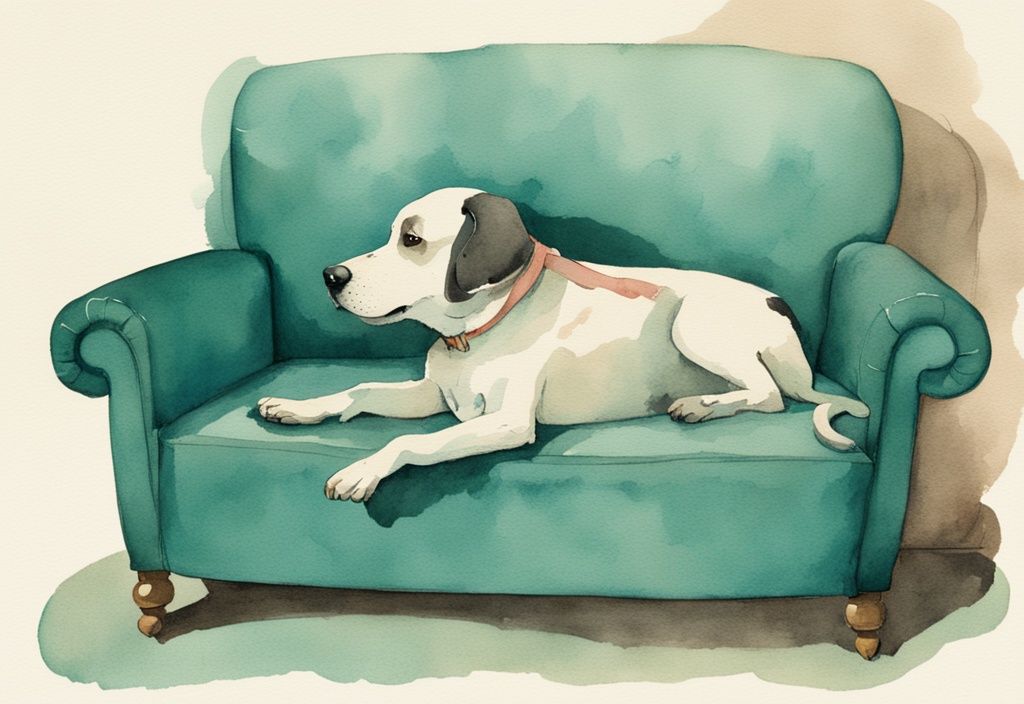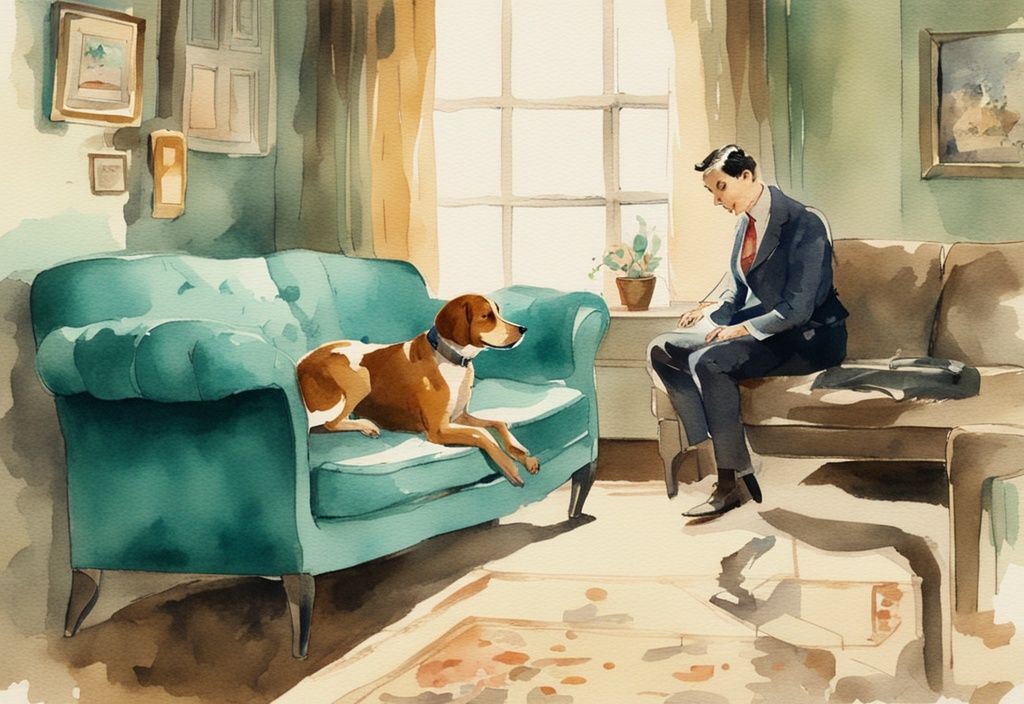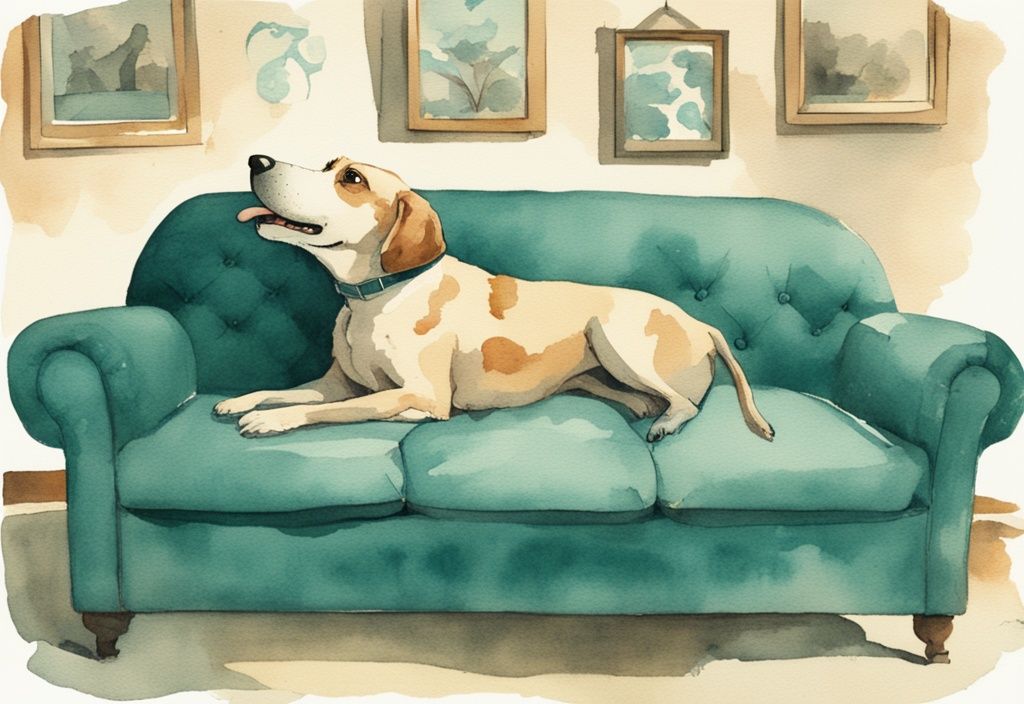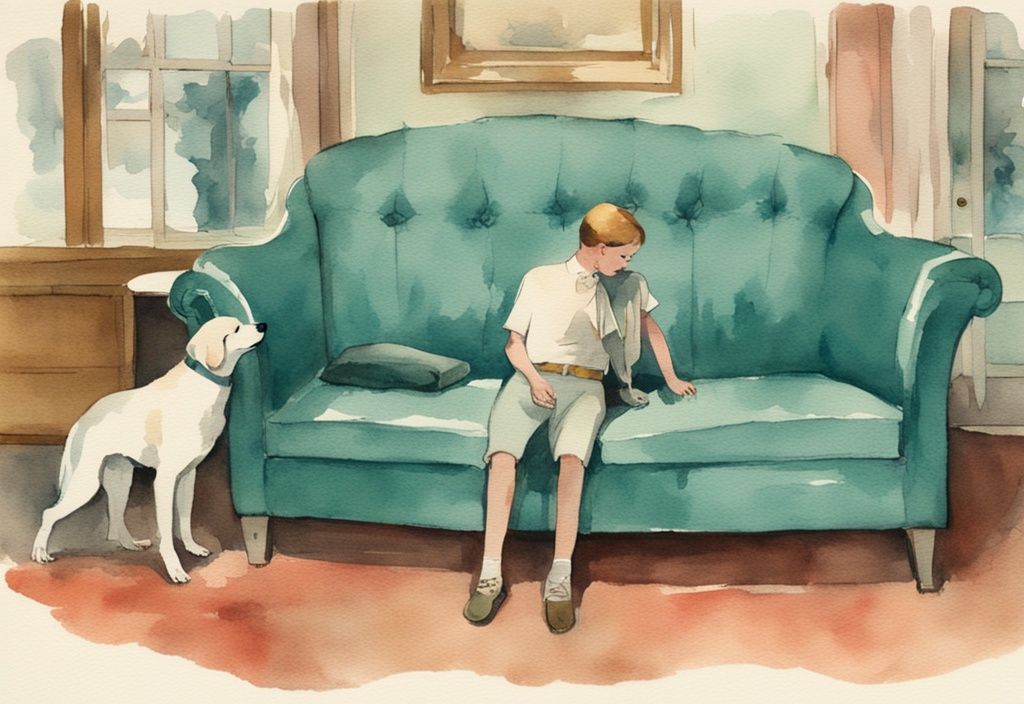Ever sat on your couch and wondered, “Why does my dog lick the couch so much?” Trust me, you are not alone! I’ve been there too. But hey, worry not! Together, we’ll dive deep into understanding the reasons behind this behavior, and more importantly, how to manage it effectively.
In this article, we’ll explore the common triggers for this tendency and some straightforward solutions to ensure that your furry friend—and your sofa—can coexist happily. Think of it as gathering tidbits of advice from a friend, except this one comes with genuine passion for canine care.
So get comfy and stay tuned, as we journey through the various twists and turns of dog behavior, ultimately enhancing the bond between you and your pet.
Quick Insights: Why Dogs May Lick Furniture
Ever caught yourself thinking, “why does my dog lick the couch?” Dogs have a quirky way of using their tongues to explore the world around them. It’s a built-in mechanism for gathering sensory information, helping them make sense of their environment. However, when this turns into non-stop licking, it signifies there’s more at play.
One possible reason your furry friend might be doing this is to grab your attention. Dogs are incredibly smart and quickly learn that certain actions, like couch-licking, get a reaction from us. It’s their way of chatting with you and saying, “Hey, notice me!”
Stress in their surroundings can also lead to this behavior. Changes in routine, new faces, or odd noises can all be unsettling. Licking can serve as a coping mechanism for your dog, helping them soothe themselves.
Don’t overlook physical health issues if you’re pondering “why does my dog lick the couch.” Sometimes, digestive problems or a lack of certain nutrients can drive dogs to seek relief by licking unusual surfaces. Addressing these health concerns can often curb the behavior.
Excessive licking might even be a sign of anxiety or obsessive-compulsive disorder (OCD). Dogs can fall into repetitive behaviors when dealing with anxiety, just like humans. If this behavior becomes compulsive, it might be time for a visit to the vet to explore treatment options.
Key Reasons Why Your Dog May Lick the Couch
If you’ve ever wondered why does my dog lick the couch, you’re not alone. Let’s dive into some of the common reasons behind this curious behavior and see how you can address it to ensure your four-legged friend stays happy and healthy.
For Sensory Exploration
One of the most common reasons why your dog licks the couch is for sensory exploration. Dogs use their mouths much like humans use their hands—to explore and understand their world. Licking helps them grasp different textures and lingering scents on the couch, turning it into a rich sensory tapestry.
Although this behavior is quite normal, it’s essential to keep an eye on it. If you’re concerned about your dog’s health, you might wonder how long they can go without water before it becomes a concern. If it turns into excessive licking, it might be a sign of a hidden issue that needs addressing.
Dealing with Anxiety and Stress
Another significant reason why dogs might lick the couch is due to anxiety or stress. Think of it as their way of self-soothing during stressful times. Changes in routines, unfamiliar environments, or even the presence of new people in the house can trigger anxiety.
Recognizing and addressing these triggers is crucial, and for more insights into understanding dog behavior, you can check out Scott’s Dog Behavior Blog at Scott’s Dog Behavior Blog. When your dog feels safe and relaxed, you’ll likely see a decrease in their licking behavior. It’s a small change that can make a big difference in their overall well-being.
As a Result of Boredom
Boredom can also explain why does my dog lick the couch. When dogs don’t get enough physical exercise or mental stimulation, they might resort to licking the couch to keep themselves entertained.

This isn’t just a quirky habit—it’s a call for more engaging activities. Incorporating regular physical exercise and stimulating toys into your dog’s daily routine can help. Interactive toys and puzzle games are fantastic for keeping their minds occupied, reducing the chance of boredom-induced licking.
Why Does My Dog Lick The Couch? Exploring Underlying Health Issues
Obsessive-Compulsive Disorder in Dogs
Some dogs might lick the couch due to Obsessive-Compulsive Disorder (OCD). This condition leads to excessive and repetitive behaviors like licking, making them seem “spaced out” and difficult to distract. When your dog can’t stop licking the couch and shows signs of OCD, there are options to help. Anti-anxiety medications can be effective, and behavior modification therapy from a professional might work wonders, too. Regular monitoring and tailored interventions can significantly alleviate OCD symptoms in your furry friend.
Canine Digestive Problems
Another reason for your dog’s couch-licking could be digestive issues or nausea. Often, dogs will lick unusual surfaces if their stomach feels uncomfortable. This is particularly common in older dogs and may be related to conditions like canine cognitive dysfunction. A check-up with your vet can confirm or rule out digestive problems. Early diagnosis and appropriate treatment can address these issues and reduce the couch-licking behavior. Always keep a close eye on your dog’s health to catch any digestive problems early on.
External and Social Causes of Couch Licking
Sometimes our furry friends develop quirky habits, and licking the couch can definitely be one of them. There are several potential reasons why your dog might be doing this, ranging from environmental changes to simple curiosity about smells and tastes. Understanding these causes can help you determine the best way to address this behavior.
Changes in Your Dog’s Environment
Environmental changes can significantly affect your dog’s behavior. New people, pets, or even unfamiliar noises can introduce stress that your dog copes with by licking the couch.
This behavior acts as a self-soothing mechanism, helping them manage the anxiety caused by these changes. Stabilizing your dog’s environment can play a crucial role in mitigating this stress-induced licking. Maintaining a predictable and consistent routine aids in reducing anxiety levels. Remember, dogs thrive on familiarity, and consistent patterns provide a sense of security.
Attraction to Spills or Human Scents on the Couch
If you’re wondering why does my dog lick the couch, consider what might be on it. Food residues, accidental spills, or even the lingering scent of human sweat can make the couch an enticing item for your dog. These scents and tastes are incredibly appealing, making it almost irresistible for your pet to lick the couch.
Dogs have a keen sense of smell and are naturally drawn to familiar scents, especially those of their owners. This is why they may frequently target spots on the couch where you often sit.
To minimize this behavior, it’s essential to regularly clean the couch. This will help remove any scents or residues that might attract your dog. For tips on eliminating odors, you can learn how to get dog smell out of a carpet, which can also apply to your couch cleaning routine. A clean couch means fewer temptations for your curious canine companion.

Practical Solutions to Stop Your Dog from Licking The Couch
Ever catch your furry friend obsessively licking the couch and wonder, “why does my dog lick the couch?” There can be various reasons. Let’s dive into some practical solutions that can address this quirky habit.
Engaging Your Dog in Physical Exercise
Most often, lick sessions on the couch stem from plain old boredom. Imagine being cooped up all day with nothing to do! Ensuring your dog gets a good amount of physical activity can help curb this behavior. Regular exercise will not only burn off all that pent-up energy but keep your dog’s mind engaged too.
Think about incorporating daily walks, playful romps at the park, and a variety of toys to keep things interesting. Games like fetch, agility training, or tug-of-war can offer fantastic physical and mental stimulation. Keeping your pup entertained diminishes the risk of them resorting to the couch for self-amusement.
Using Deterrents Such As Bitter Sprays
If exercise doesn’t fully solve the issue, consider using deterrents like bitter sprays. These sprays are especially crafted to taste foul, making the couch a lot less appealing for your dog. Simply spray them on the areas your dog loves to lick.
Additionally, using couch covers or fabrics that your dog doesn’t like can also be beneficial. Coupling these deterrents with positive reinforcement training can bring about lasting change. Reward your pup when they avoid the couch, showing them that this behavior isn’t desired. This combination can work wonders in the long run.
When to Seek Veterinary Assistance
Embarking on the journey to understand why your dog might be licking the couch can sometimes lead you straight to your vet. This behavior may often require a professional evaluation, especially if it’s sudden or comes with other worrying signs. If you see lethargy, vomiting, or changes in appetite alongside the licking, it’s really time to consult your vet. Such behavior could be hinting at underlying health problems that need a professional touch.
Identifying Medical Causes of Couch Licking
Your vet can run various diagnostics to get to the bottom of why your dog is licking the couch. It could be anything from gastrointestinal problems to more severe health issues. Diagnostics not only shed light on the problem but also guide the way for effective treatment plans.
Regular check-ups are crucial for keeping your dog in top shape and catching any potential issues early. Those routine vet visits can help you keep tabs on your dog’s behavior and health, enabling timely interventions that could stop excessive couch licking in its tracks.
Addressing Anxiety or OCD in Dogs
Sometimes, when pondering why your dog licks the couch, the answer might lie in psychological factors like anxiety or OCD. Dogs with these conditions often display repetitive behaviors, such as constant licking. Treatments for anxiety or OCD can involve anti-anxiety meds prescribed by your vet. These medications can normalize your dog’s state of mind and reduce the urge to lick.
Behavior modification therapy is another highly effective approach. A pet behaviorist can provide a tailored plan to manage your dog’s anxiety or OCD. These professionals use strategies that address the root cause, incorporating relaxation techniques and positive reinforcement to transform undesirable behaviors.

Creating a stable, low-stress environment can make a world of difference for dogs dealing with anxiety. Consistent routines, minimal loud noises, and avoiding sudden changes can help manage anxiety-induced behaviors. Paired with professional guidance, these measures can significantly reduce couch licking triggered by psychological distress.
FAQs about Dogs Licking Furniture
Is it healthy for dogs to lick furniture?
Occasional couch licking can be quite normal for dogs, usually stemming from their innate curiosity. However, when licking becomes persistent, it might be a sign of underlying issues.
Your furry friend might ingest harmful substances or even hurt their tongue from too much licking. To keep things safe, make sure any surface your dog licks is free of hazardous chemicals. Understanding why your dog licks the couch can help address and manage this quirky habit effectively.
What indications suggest my dog’s licking may be a health issue?
Sometimes, licking can be more than just an odd habit. If your dog suddenly starts this behavior and it’s hard to distract them from it, it could be a red flag. Changes in appetite or overall behavior are also crucial clues. Paired with symptoms like vomiting, diarrhea, or sluggishness, finding out what’s wrong quickly becomes essential.
Despite trying different methods, if your pup keeps at it, it might indicate deeper health or behavioral problems. Consulting with a vet can provide the necessary professional assessment and intervention.
Can I change my dog’s diet to reduce couch licking?
Sometimes, what your dog eats can play a big role in their behavior. Nutritional deficiencies might lead to unusual licking habits, including the couch. Ensuring your dog’s diet is balanced and adequate is a good starting point.
It’s always a good idea to talk to your vet about potential dietary changes or supplements. Tweaking your dog’s diet to support digestive health can effectively minimize licking caused by stomach problems. This approach can enhance your dog’s overall well-being, reducing the compulsion to lick the couch.
Summary
- Figuring out why your dog licks the couch involves looking at physical, environmental, and psychological factors. Each of these plays a big part in your dog’s behavior. Dogs are naturally curious and love to explore with their mouths. But if the licking becomes excessive, it might point to a deeper issue that needs attention.
- Step one in tackling why your dog licks the couch is identifying the root cause. It might be their way of dealing with anxiety, seeking a bit of attention, or just fighting off boredom. Once you know the why, you can take specific actions to reduce this habit.
- Managing this issue is best done by combining physical exercise, mental stimulation, environmental stability, and advice from a vet. Regular walks, fun and interactive toys, and sticking to a consistent daily routine can make a world of difference. To ensure you’re feeding your dog the right amount, you might want to learn how many cups are in a pound of dog food.
- Every dog is unique, and they’ll each respond differently to various strategies. Patience and a tailored approach are key. Keep a close eye on your dog’s behavior and adjust your methods as needed. Customizing your solutions to fit your dog’s needs will lead to a happier and healthier environment for both of you.
Don’t forget to get a vet’s input to rule out any health issues.
